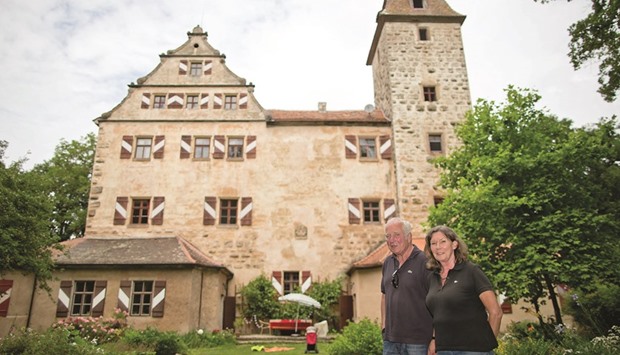Dozens of rooms and acres of garden — that’s what most people think of when they imagine living in a castle.
But when Baroness Mechthild von Le Suire talks about her castle in Bavaria’s Altmuehltal Nature Park it doesn’t sound particularly luxurious.
“It’s a dream and a nightmare at the same time,” says the 66-year-old with a laugh.
She and her husband Baron Andreas von Le Suire have lived in the rather idyllic-looking Schloss Altenmuhr for several years and they’re now familiar with the pitfalls of living in a building which dates back to the 10th century.
They know what it’s like, for example, to have the builders cursing because they’ve had to stay up till midnight to try and install a fitted kitchen into a kitchen with sloping floors and walls which bulge in odd places.
“They joked they would never come again,” says Mechthild von Le Suire, who used to work as a doctor in Munich.
“Nothing’s straight here,” she soon realised.
Their grandchildren’s balls always roll into the same corners and they’ve had to make countless castor cups for tables, chairs and cupboards to stop them wobbling.
The internet only works with a wi-fi booster because the walls are so thick.
Andreas von Le Suire accepted the inheritance because he likes pottering about and because he loves the building’s history and the memories it contains.
The 67-year-old is happy to show visitors around the castle, which has been privately owned by his family since 1840.
Maintaining the building and its cultural heritage is important to him.
“When we re-plastered the walls we found a newspaper dating back to 1860,” he says.
There’s always plenty to do.
“It’s basically a permanent construction site,” he says. “But I knew what taking responsibility for this building meant.”
Because the building is listed, all extensive renovation work has to be agreed beforehand with the authorities.
“It’s preferable that listed buildings are used and lived in,” says a spokesman for Bavaria’s heritage conservation authority.
But the Le Suires aren’t entitled to public funding.
In addition to the maintenance and renovation costs, the Le Suires also get steep monthly bills for water, heating and electricity.
In the winter they keep to just a few rooms, in order to keep the heating bills down.
They don’t know if either of their children will want to take on the castle themselves one day.
“At least it’s not the case that they say, ‘I don’t want to have anything to do with the old ruin’,” says Andreas.
But he also knows that a rural castle doesn’t fit easily into everyone’s life plan.
Until their retirement, he and his wife only used the castle as a weekend getaway.
But unwilling heirs and a lack of investors pose an increasing problem for old buildings in Germany, particularly in the former East, where land reform imposed by the Soviets in 1945 meant that nobles had their land confiscated and the line of inheritance was broken.
In former West German regions like Bavaria, castles and palaces are often still tied to agricultural land, which also has to be maintained.
“You’ve got lots of room,” the Le Suires often hear when a relative wants to store a piece of furniture or a picture.
“Lots of space — sometimes too much,” comes the reply. —DPA

DREAM HOME: With 38 rooms, 60 radiators and hectares of garden, many people would dream of a castle like Baron and Baroness Le Suire’s in Bavaria. So what is it that makes them unhappy with their home?
